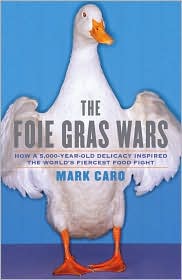
My Thoughts: I snatched up The Foie Gras Wars on the New Non-Fiction bookshelf at my local library. While it was the sensationalist title that initially caught my eye, Caro’s personable style of writing drew me in and kept me interested from start to finish. I appreciated how Caro’s background as an entertainment reporter distinguished his voice and style from the Michael Pollans and Marion Nestles of the food politics writing world.
As a semi-frequent fine diner and full-time news media hound, I’ve read bits and pieces here and there about the controversy over foie gras. I was well aware that the substance was banned for a period of time in Chicago and that Philadelphians were considering similar legislation, but I never understood the full picture until reading this book. I was really surprised to discover that it was Charlie Trotter who started this whole messy foie gras war. Not cool Chaz, not cool at all.
Some of the funniest parts of The Foie Gras Wars looked at the lengths Chicago chefs went to in order to serve the illegal substance. From giving it away gratis to establishing membership-only secret clubs, foie gras never really disapeared from the city’s fine dining scene. On the Philly front, cranky old Georges Perrier‘s (of Le Bec-Fin fame) tit for tat with the animal rights group Hugs for Puppies was a riot as well.
Aside from examining the politics and personalities behind the battle lines, Caro also paid a visit to a few of the U.S.’s major foie gras farms, including Hudson Valley Foie Gras and Sonoma Foie Gras, to witness gavage (force-feeding) firsthand. Although Caro doesn’t outwardly state whether or not he feels that foie gras production is cruel, from his tone and words, I gathered that he’s more for than against.
After reading Caro’s detailed accounts of gavage in both North America and in France, I remain comfortable consuming foie gras. However, I must admit that the images that surface from Googling ‘gavage, foie gras’ makes my stomach turn slightly.
Click below to watch Chef Dan Barber of Blue Hill and Blue Hill at Stone Barns discuss the potential for natural foie gras—it’s awesome. Thanks again, Vanessa!

Very cool book. I did a Q&A with Caro back in April, check it out!